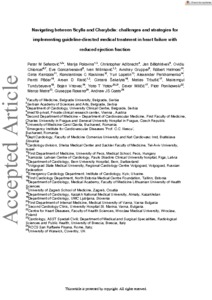Seferović, PM;
Polovina, M;
Adlbrecht, C;
BĚlohlávek, J;
Chioncel, O;
Goncalvesová, E;
Milinković, I;
Grupper, A;
Halmosi, R;
Kamzola, G;
et al.
Seferović, PM; Polovina, M; Adlbrecht, C; BĚlohlávek, J; Chioncel, O; Goncalvesová, E; Milinković, I; Grupper, A; Halmosi, R; Kamzola, G; Koskinas, KC; Lopatin, Y; Parkhomenko, A; Põder, P; Ristić, AD; Šakalyt, G; Trbušić, M; Tundybayeva, M; Vrtovec, B; Yotov, YT; Miličić, D; Ponikowski, P; Metra, M; Rosano, G; Coats, AJ
(2021)
Navigating between Scylla and Charybdis: challenges and strategies for implementing guideline-directed medical therapy in heart failure with reduced ejection fraction.
Eur J Heart Fail, 23 (12).
pp. 1999-2007.
ISSN 1879-0844
https://doi.org/10.1002/ejhf.2378
SGUL Authors: Rosano, Giuseppe Massimo Claudio
![[img]](https://openaccess.sgul.ac.uk/113863/1.hassmallThumbnailVersion/ejhf.2378.pdf)  Preview |
|
PDF
Accepted Version
Available under License ["licenses_description_publisher" not defined].
Download (2MB)
| Preview
|
Abstract
Guideline-directed medical therapy (GDMT) has the potential to reduce the risks of mortality and hospitalisation in patients with heart failure (HF) with reduced ejection fraction (HFrEF). However, real-world data indicate that many patients with HFrEF do not receive optimised GDMT, which involves several different medications, many of which require up-titration to target doses. There are many challenges to implementing GDMT, the most important being patient-related factors (comorbidities, advanced age, frailty, cognitive impairment, poor adherence, low socioeconomic status), treatment-related factors (intolerance, side-effects) and healthcare-related factors that influence availability and accessibility of HF care. Accordingly, international disparities in resources for HF management and limited public reimbursement of GDMT, coupled with clinical inertia for treatment intensification combine to hinder efforts to provide GDMT. In this review paper, authors aim to provide solutions based on available evidence, practical experience, and expert consensus on how to utilise evolving strategies, novel medications, and patient profiling to allow the more comprehensive uptake of GDMT. Authors discuss professional education, motivation, and training, as well as patient empowerment for self-care as important tools to overcome clinical inertia and boost GDMT implementation. We provide evidence on how multidisciplinary care and institutional accreditation can be successfully used to increase prescription rates and adherence to GDMT. We consider the role of modern technologies in advancing professional and patient education and facilitating patient–provider communication. Finally, authors emphasise the role of novel drugs (especially sodium–glucose co-transporter 2 inhibitors), and a tailored approach to drug management as evolving strategies for the more successful implementation of GDMT.
| Item Type: |
Article
|
| Additional Information: |
This is the peer reviewed version of the following article: Seferović, P.M., Polovina, M., Adlbrecht, C., Bělohlávek, J., Chioncel, O., Goncalvesová, E., Milinković, I., Grupper, A., Halmosi, R., Kamzola, G., Koskinas, K.C., Lopatin, Y., Parkhomenko, A., Põder, P., Ristić, A.D., Šakalytė, G., Trbušić, M., Tundybayeva, M., Vrtovec, B., Yotov, Y.T., Miličić, D., Ponikowski, P., Metra, M., Rosano, G. and Coats, A.J. (2021), Navigating between Scylla and Charybdis: challenges and strategies for implementing guideline-directed medical therapy in heart failure with reduced ejection fraction. Eur J Heart Fail, 23: 1999-2007, which has been published in final form at https://doi.org/10.1002/ejhf.2378. This article may be used for non-commercial purposes in accordance with Wiley Terms and Conditions for Use of Self-Archived Versions. This article may not be enhanced, enriched or otherwise transformed into a derivative work, without express permission from Wiley or by statutory rights under applicable legislation. Copyright notices must not be removed, obscured or modified. The article must be linked to Wiley’s version of record on Wiley Online Library and any embedding, framing or otherwise making available the article or pages thereof by third parties from platforms, services and websites other than Wiley Online Library must be prohibited. |
| Keywords: |
guideline directed medical therapy, health education, heart failure, medication adherence, optimal treatment, quality of care, sodium-glucose cotransporter-2 inhibitors, 1102 Cardiorespiratory Medicine and Haematology, Cardiovascular System & Hematology |
| SGUL Research Institute / Research Centre: |
Academic Structure > Molecular and Clinical Sciences Research Institute (MCS) |
| Journal or Publication Title: |
Eur J Heart Fail |
| ISSN: |
1879-0844 |
| Language: |
eng |
| Publisher License: |
Publisher's own licence |
| PubMed ID: |
34755422 |
| Dates: |
| Date |
Event |
| 2021-12-21 |
Published |
| 2021-12-13 |
Published Online |
| 2021-11-05 |
Accepted |
|
 |
Go to PubMed abstract |
| URI: |
https://openaccess.sgul.ac.uk/id/eprint/113863 |
| Publisher's version: |
https://doi.org/10.1002/ejhf.2378 |
Statistics
Item downloaded times since 18 Nov 2021.
Actions (login required)
 |
Edit Item |



